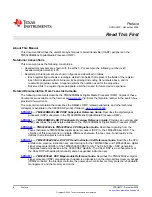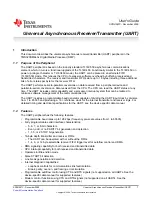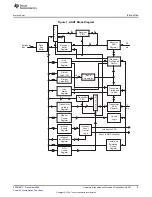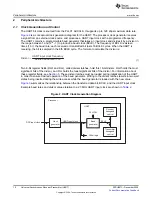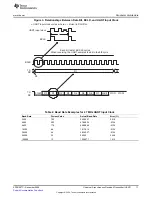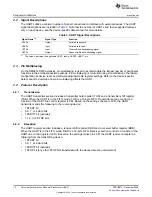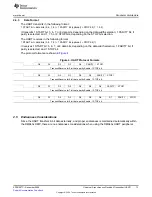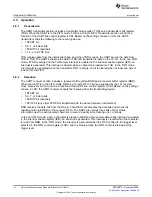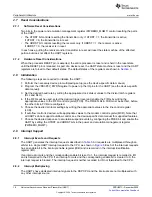
Preface
.......................................................................................................................................
6
1
Introduction
........................................................................................................................
7
1.1
Purpose of the Peripheral
..............................................................................................
7
1.2
Features
..................................................................................................................
7
1.3
Functional Block Diagram
..............................................................................................
8
1.4
Industry Standard(s) Compliance Statement
........................................................................
8
2
Peripheral Architecture
......................................................................................................
10
2.1
Clock Generation and Control
........................................................................................
10
2.2
Signal Descriptions
....................................................................................................
12
2.3
Pin Multiplexing
........................................................................................................
12
2.4
Protocol Description
...................................................................................................
12
2.5
Endianness Considerations
..........................................................................................
13
2.6
Operation
................................................................................................................
14
2.7
Reset Considerations
..................................................................................................
18
2.8
Initialization
.............................................................................................................
18
2.9
Interrupt Support
.......................................................................................................
18
2.10
DMA Event Support
...................................................................................................
20
2.11
Power Management
...................................................................................................
20
2.12
Emulation Considerations
.............................................................................................
20
2.13
Exception Processing
.................................................................................................
21
3
Registers
..........................................................................................................................
21
3.1
Receiver Buffer Register (RBR)
......................................................................................
22
3.2
Transmitter Holding Register (THR)
.................................................................................
23
3.3
Interrupt Enable Register (IER)
......................................................................................
24
3.4
Interrupt Identification Register (IIR)
................................................................................
25
3.5
FIFO Control Register (FCR)
.........................................................................................
26
3.6
Line Control Register (LCR)
..........................................................................................
28
3.7
Modem Control Register (MCR)
.....................................................................................
30
3.8
Line Status Register (LSR)
...........................................................................................
31
3.9
Divisor Latches (DLL and DLH)
......................................................................................
33
3.10
Peripheral Identification Registers (PID1 and PID2)
..............................................................
35
3.11
Power and Emulation Management Register (PWREMU_MGMT)
..............................................
36
Appendix A Revision History
......................................................................................................
37
3
SPRU997C – December 2009
Table of Contents
Submit Documentation Feedback
Copyright © 2009, Texas Instruments Incorporated






